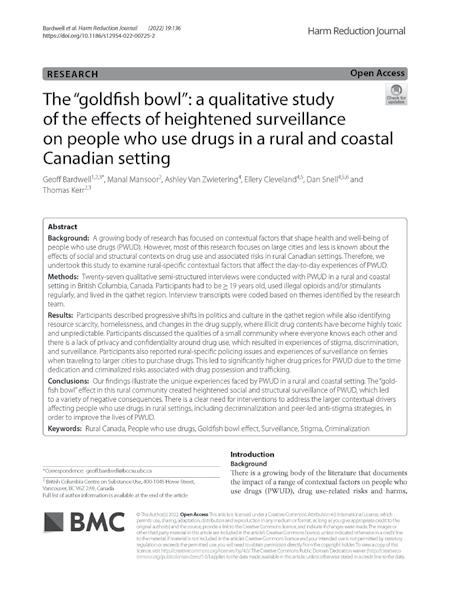
4 minute read
Everyone here will benefit when drugs are no longer a crime: study
QATHET’S WISDOM ON THE OPIOID CRISIS
BY PIETA WOOLLEY
Advertisement
Local citizens who use fentanyl, crystal meth and cocaine feel like they are constantly under watch by police and the community – a situation that adds to stigma and possibly, harm and death. So says a new research paper published in December in the online Harm Reduction Journal.
The “Goldfish Bowl”: a qualitative study of the effects of heightened surveillance on people who use drugs in a rural and coastal Canadian setting is a collaborative work by three authors who work with people who use drugs here in qathet, and researchers from the BC Centre on Substance Use and UBC.
Locals who contributed to the paper include Ashley Van Zwietering (qathet Community Action Team), Ellery Cleveland (qCAT and LIFT) and Dan Snell (qCat, LIFT, and SUSTAIN.)
Few studies document the experiences of people who use drugs (PWUD) outside of large cities, the paper notes; this study adds to a very small pool of research.
The authors interviewed 27 of this region’s PWUD – about half live in the supported housing building on Joyce. They were hoping to “characterize the unique features of the qathet region as they related to drug use and health and well-being,” and to “examine the impact of social, structural and environmental contexts on the day-today lives of PWUD.” In 2021, the study noted, the overdose epidemic here claimed lives at twice the Provincial average.
The study contains several quotes from those interviewed which illuminate the perceived experience of PWUD. They include:
“Like there were no homeless people in this town my entire life here until like five years ago. And then all of a sudden there’s 50 of us-plus living on the street.”
“The drug supply has become almost unbearably toxic here.”

THE GOLDFISH BOWL: An article about how people who use drugs in qathet describe their perception of being constantly monitored was recently published in the Harm Reduction Journal. Download a copy at bit.ly/3jC774k
“This town, the entire town knows who I am, There’s no privacy in a small town. I go into a store, and I’m asked to leave because I’m a drug dealer. Or I get dirty looks all throughout this town. It’s because of my addiction that they’re judging me.”
“City police are way different than RCMP rookies. Yeah, the old Staff Sergeant retired last year so we’ve got a new one and the RCMP up here are pricks, actually.”
“[The RCMP] will throw you to the ground and like beat people.”
“The cops are patrolling the [f$#!ing] ferry terminals… see who’s driving what and who’s going where, why. You got to roll down your window and tell them why you’re getting on the ferry.”
“We call the ferries the gauntlet because the ferry workers think they’re frickin’ border security and they’ll call the cops on anybody.”
In the discussion section, the authors note that “Participants from our study did not simply just experience stigma through rumours and gossip from others in the community; they also described the coinciding judgment and surveillance in pharmacy and public settings, which led some to limit their public outings…. Studies on experiences of stigma in healthcare settings have shown how these can result in healthcare delays and avoidance leading to negative health outcomes.”
The authors call for education and awareness campaigns; and workshops that include both PWUD and the public “which are built on a premise that a lack of contact between groups fuels fear and discomfort and bringing different groups together would provide opportunities for connection.”
Finally, the authors critique the criminalization of drugs – that is, making drug use a crime.
Providing PWUD with a government-funded safer supply of drugs would reduce overdoses, they argue, as well as “alleviate financial stressors” and end the “need for PWUD to engage in criminalized activities to support their use.”










